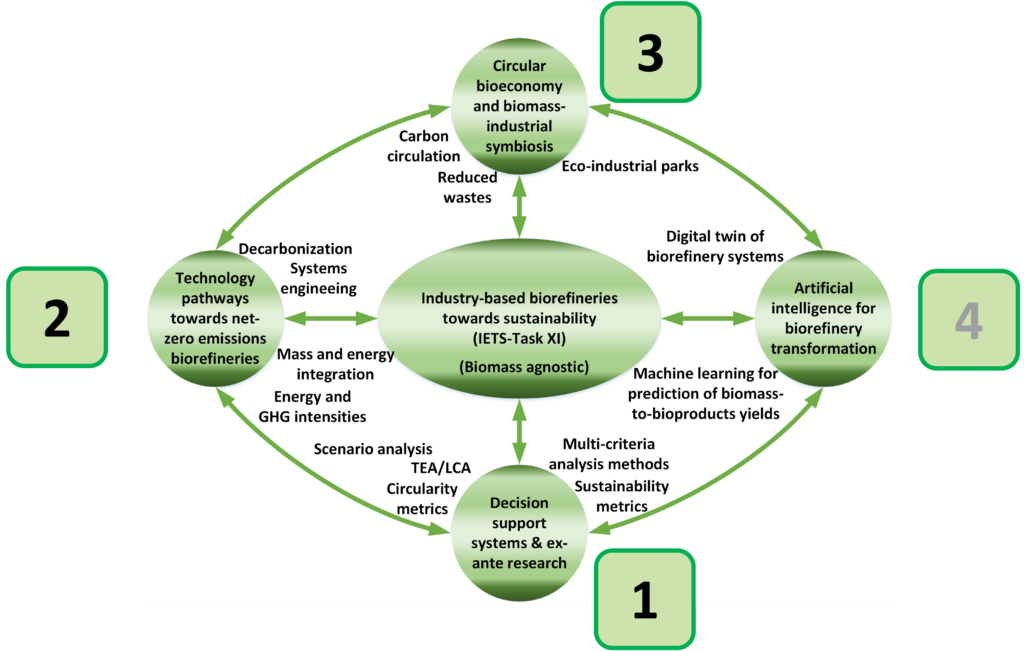Industry-based biorefineries towards sustainability
Task
XI
Start date 2008-05-01
End date 2026-03-31
Latest developments
This Task (formerly Annex) started already in March 2008 and the initial scope was completed during 2017. Since then, the Task work has continued with three more Subtasks. The first proposal for a Subtask focusing on decision support systems (DSS) and ex-ante research was approved in November 2018. An updated proposal approved in March 2022 as well as a proposal for a new Subtask on Technology pathways towards net-zero/negative emission biorefineries. Most recently, the proposal for a third Subtask on Circular Bioeconomy and Industrial Symbiosis was approved. The image below describes the landscape where the ongoing and (one) planned Subtasks are situated.

Annual Report 2023-2024
Recent activities and plans are described in this document available for download.
Background
Task XI has a multi-disciplinary approach to the concept of biorefineries integrated in industrial complexes, aiming at the optimization of energy efficiency in global terms. The approach is based on industry needs and application, combining the knowledge of industrial technologies with energy efficiency and biomass conversion processes. Different industrial sectors are considered, including the integration of bio with oil refineries, together with CCS options yielding hydrocarbons/hydrogen, looking into technology and systems aspects for a better use of energy.
Task XI was launched in 2008 (as Annex XI Industry-based Biorefineries) and has developed with the objective of sharing knowledge and experiences, as well as conducting research assessment based studies and R&D projects to promote the industry-based biorefineries concept.
So far, activities have been implemented to reinforce international cooperation to structure partnerships that lead to optimization of energy efficiency in existing and new integrated industrial plants. Activities also include R&D on sustainability assessments, biofuels/bio-materials production technologies, and yields from thermo-chemical and biological conversion of biomass and waste materials. Read about the earlier work of this Annex/Task.
Task Members
Austria, Canada, Portugal and Sweden.
Task Manager
Paul Stuart , Polytechnique Montréal, Canada
Marzouk Benali (Co-Task Manager), Natural Resources Canada, CanmetENERGY in Varennes, Canada
Steering Committee
- Paul Stuart, Canada
- Marzouk Benali, Canada
- Isabel Cabrita, Portugal
- Jorge Costa, Portugal
- Bettina Muster, Austria
- Christoph Brunner, Austria
Subtask 1: Decision Support Systems and Ex-ante Research
Objectives
- Advance and share the knowledge on decision support approaches and tools.
- Better understand the complex decision-making needs of industry and government related to setting bioeconomy strategies.
- Demonstrate the pertinence relative to complex bioeconomy decisions critical to industry, especially considering ex-ante research.
- Establish and disseminate the best practices and guidelines with respect to decision support tools and ex-ante scenario analysis methods.
Key Activities
- Review decision making methodologies and decision support tools, and establish harmonized DSS and Ex-ante approaches/methods.
- Synthesize industrial case studies in the area of DSS Ex Ante.
- Organize a series of webinars and workshops.
Subtask Managers
Paul Stuart, Polytechnique Montréal, Quebec, Canada
Marzouk Benali, Natural Resources Canada, CanmetENERGY in Varennes, Quebec, Canada
Subtask 2: Technology Pathways towards Negative and/or Net-Zero Emission Biorefineries
Objectives
- Focus on reviewing and disseminating technical solutions for biorefineries to reach negative or net-zero GHG emissions.
- Available methods and approaches to increase energy efficiency and enhance the integration of renewable energy in industry will be applied and re-framed for biorefineries
Key Activities
- Review emerging technologies for combined resource and energy efficiency with overall impacts on GHG emissions in biorefineries
- Evaluate and adapt available tools and methodologies for energy efficiency and renewable energy systems integration
- Synthesize industrial case studies (conceptual and demonstrated) in at least three different industrial sectors
Subtask Manager
Bettina Muster-Slawitsch, AEE-Institute for Sutainable Technologies, Austria
Subtask 3: Circular Bioeconomy and Biomass-oriented Industrial Symbiosis
Approved proposal – March 2023
Objectives
The Subtask will focus on research assessment-based studies and R&D projects sharing knowledge, experiences and lessons learned in industrial processes and process integration methodologies to promote systems’ analysis of industrial solutions towards decarbonization, applying the circular bioeconomy concept through the integration of biorefineries.
Advancing knowledge on best practices and methodologies through ongoing projects presented by organizations of countries interested in participating, is expected to lead to identify gaps and common issues, as well as critical paths worth focusing for further studies reinforcing international collaboration.
The scope of the work is mainly on systems’ analyses to identify optimised solutions based on full carbon circularity approaches, sharing information on strategies and methodologies to assess the potential for establishing industrial symbiosis involving biorefineries and other industrial systems using biomass.
Activities
A – Information sharing on policy and best practices to design strategies
B – Enabling a shared view on the state-of-the-art of integrated systems using biorefineries, including industrial symbiosis case studies
C – Creating new system loops in the context of circular bioeconomy and biomass-oriented Industrial Symbiosis to support the deployment of circular bioeconomy
D – Networking with other Tasks and TCPs
E – Management and dissemination.
Deliverables
• Survey on the state-of-the-art of biorefineries integration for circular bioeconomy strategies
• Technical Brochures on Case Studies
• Annual Progress Reports
• Workshop for dissemination of results
• List of research needs in domains related to the scope of the Subtask for further work
• Briefings and webinar reports
Subtask Management team
Isabel Cabrita, School of Management, Engineering and Aeronautics ISEC Lisboa, Portugal
Jorge Costa, School of Management, Engineering and Aeronautics ISEC Lisboa, Portugal
